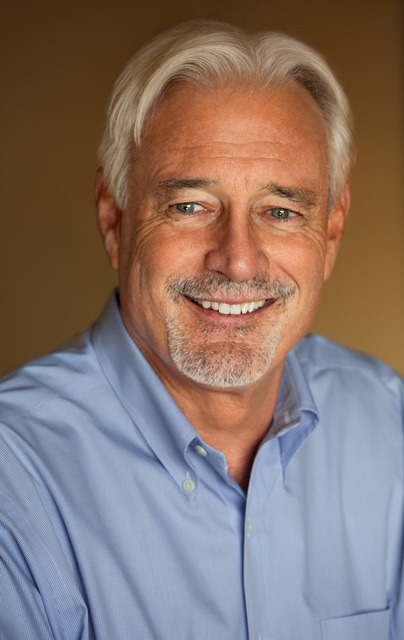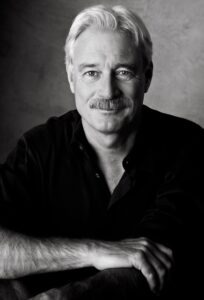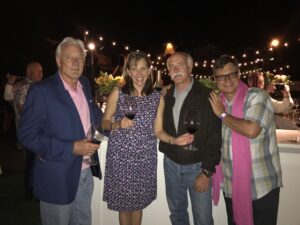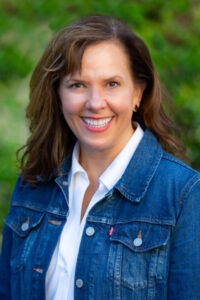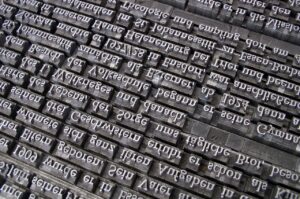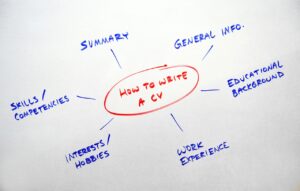This past month a very good friend of mine passed away. Jim Laube died after a short illness. When he passed away he was surrounded by his loving family. He was 73 years old. He started his career as a newspaperman, and went on to dedicate 40 years of reporting for Wine Spectator, as well as authoring four books, including “Wine Spectator’s California Wine.”
In the last dozen or so years, Jim and I formed a close friendship. He was a great mentor to me and shared lots of great wine industry stories. In November 2018 he and I sat down to discuss his career. He encouraged me to publish his story in a series of posts, of which this is Part One. (Please note: I did write these stories in 2018, putting many edits into them and finalizing them in 2019. Posting them here as he retold them makes it feel like he is right here with us today.)
Crafting a Career in Journalism, Part One
Learning how people have made a career in the wine industry fascinates me. Over the years I’ve met many interesting and successful people in the wine industry. In 2018 I sat down with James Laube, the Senior Editor of Wine Spectator, to get his thoughts on how he came to be a wine writer, what it means to be a wine critic and the future of wine journalism in the information age. Jim’s career spans 50 years in journalism with 40 years focused on wine.
Over the course of our conversation, three main themes emerged. These were: nuts and bolts journalism, changes Jim has experienced in winemaking and the changes he has experienced in journalism. Overriding all of these themes was Jim’s love of journalism. He is a newsman through and through. How did he get where he is today?
What did you want to be when you grew up? I loved journalism. I had been a good writer in school, and my teachers encouraged me. I was also very athletic, playing football, basketball, and baseball in school. Local sportswriters knew my name, and I knew the game. With the encouragement of my teacher, I applied to the Anaheim Bulletin to write for the sports page when I was 15. I continued to play basketball, but during the off-season I wrote about other sporting events for the paper.
After getting my undergraduate degree in history from San Diego State University, I went back to get my master’s degree in Journalism. Going back to journalism was a life correction. Some said I was overqualified with a graduate degree, but journalism has become my life’s work.
All successful people have key people who supported them in their youth. Who were some important people in yours?
My grade school English teacher Mrs. Lois Butler was very important to my writing career. She encouraged me to write, enjoyed the assignments I turned in and also pushed me into sports writing in high school.
Growing up, my mom was a teacher, and every summer I had to go to summer school because she didn’t want us to lose what we’d learned during the school year. One year I reluctantly signed up for typing. That typing teacher was so great. I was the only boy in the class. She was so enthusiastic about typing and taught typing to music–so fun. Being a boy who could type was great. In school I started turning in my assignments typed, the only boy in class who did. The girls turned in their reports typed. It may be needless to say, but having a fast typing speed in reporting is important.
Another key person in shaping my life as a journalist was my college Mexican History teacher, Paul Vanderwood. He really brought the history of Mexico to life and gave me a renewed interest in journalism, history and storytelling. Taking his class brought me back to journalism.
What mentors did you have in your life?
Robert Mondavi: He was such an advocate for the California wine scene. He was a great mentor and had me at many major events for his winery and for the wine world. He was a man of pure determination. You really felt his importance.
Harvey Posert: He was a great mentor and a true friend. He treated me very well and always included me in things that were going on at Mondavi. I was seated next to Bob at meetings and events. Harvey also clued me into a lot of things that were happening in the wine industry.
Andre Tchelistchiff: Andre was such a huge mentor for me. When I was seeking information about grapegrowing or winemaking, Andre would patiently educate me. He was so knowledgeable about all things wine and was happy to help me learn.
Why do you think you were successful in journalism? First of all, I put in the time and did the work. It really is nuts and bolts journalism, which is writing the facts in a concise and truthful manner so that the reader can quickly understand the story.
Additionally, when I was writing about wine, my stories would run in the local paper, and interesting stories would be picked up by the Associated Press. The San Francisco AP Chief liked wine and enjoyed picking up my stories. Wine and farming stories played well with audiences across the country. A farmer in the Midwest would find the Napa farming stories interesting. It doesn’t hurt that the Napa Valley is a picturesque place. Getting the story and a picture in the paper with my name under it allowed me to make a name for myself.
Something else that helped was that I was truly curious about the wine industry. I learned everything I could about the business of wine and grape growing. I could explain complicated information while keeping the story interesting. That really is the essence of journalism; taking a complicated issue and breaking it down to the fundamentals and explaining it to the reader.
What drew you to the wine industry and your role as a wine journalist? I have always liked living in small towns. Napa was a small town and I became a member of the community. I was drawn to wine because it is farming. Almost everything people need comes from a farm. Wine also had interesting people behind an intoxicating product. Starting out as a writer, I had wanted to be a biographer. The wine industry allowed me to write about interesting people in farming.
Why did you get into writing about wine specifically? When I started, wine was still a very intimidating product. In the late ‘70’s wine was becoming a part of people’s lives. There was not a lot of good wine to be had. Some French, some Spanish, but wine quality was not where it is today. With this new exposure to wine, people wanted to know more about it, and I enjoyed writing about it. I went to every wine tasting I could to educate myself about what makes a good wine, what makes a bad wine. I studied wine to teach others about it.
What is your role for wine drinkers? Over the years I have learned that my role as a wine journalist is to educate wine drinkers. I tell them the stories behind the wine. I teach people how to taste wines for themselves, to find out what they like and to be able stand behind their own opinions about wine.
With a love of journalism Jim created a successful career in wine writing. He has written the stories behind the wine, and educated his readers about wine styles, quality and producers. A lot of hard work went into his success.
